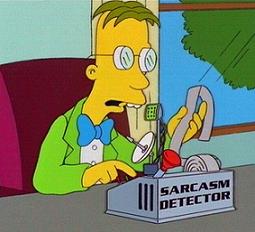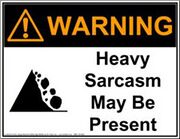- Portals
- The Current Year
- ED in the News
- Admins
- Help ED Rebuild
- Archive
- ED Bookmarklet
- Donate Bitcoin
Contact an admin on Discord or EDF if you want an account. Also fuck bots.
Sarcasm
- Not to be confused with Irony.


Sarcasm is the lingua franca of the Internets. It's great because it allows you to be critical of something without actually exposing your opinion on the subject. Also, it helps depersonalize the subject of criticism, which is important if you want to be really, really cruel and insulting.
- Oh sure, that's just really impressive that you built that fursuit yourself. You must be so proud.
Sarcasm evolved in Britain during Victorian times as a result of everyone being so bloody polite to each other that it was almost impossible to have a heated debate.
Suddenly one could pretend to admire the gallery of stuffed heads on a colleague's wall and say "Really? You managed to hit a 25 foot hippo with an elephant gun at 20 meters with the aid of just three servants and twelve black person? How impressive!" And, to get the slightest of smirks from perhaps your butler and wife (who were probably the same person, who knows how they bred in those days) after a few decades it had become quite fashionable, and America soon began to catch up. Early experiments were crude, often including a negative suffix:
- Oh you look great...NOT!
But eventually they got the hang of it and now we all enjoy a good laugh at Germany's expense, because you can't be sarcastic in German. Look at Governor Schwarzenegger!
Usage
Sarcasm is a very delicate and precise art form, which must be worked at for many long years before one can finally master its subtle intricacies. Indeed, very few have ever achieved true mastery of this international language, but for those who feel up to the task of learning sarcasm, some notes on proper usage follow. It is found that not many people are actually able to use sarcasm effectively, and it is mostly those who believe they can who make themselves look like a jackass when they try. It is also very important to know that when using sarcasm on someone from another country, you should expect a quick response, especially from the French or the Americans.

In the real world, sarcasm can be very easily conveyed by talking very loudly, repeatedly using the word "totally" with exaggerated emphasis and phrasing everything as a question. In fact, in some places where people have become especially well-practiced with these signs of sarcasm (perhaps most notably the United States, where sarcasm was declared the official state language in 2002) the "challenge" is not how to express when one is being sarcastic, but when one isn't. In places like Great Britain; where sarcasm was born and raised, sarcasm has developed into the natural rhythm of speech, often making it hard to determine when one is being sarcastic or not if you aren't actually from there (The rest of the world). Also they have evolved past the need to say "...not" at the end of every sentence using sarcasm in it, or emphasizing words like "totally" or "really?".


In the world of the Internet, however, expressing sarcasm is rarely quite so straightforward.
Since a large majority of Internet users suffer from Asperger's Syndrome and therefore have great difficulty recognizing sarcasm in a textual format, certain techniques must often be utilized to ensure that you are correctly understood.
- Be sure to use superfluous exclamation points and/or question marks, as the situation demands. Always remember, on the Internets, moar is always moar.
- Use of caps lock (and font size 5, if you're feeling especially saucy) is encouraged. This is because, in real life, sarcastic comments must always be shouted, so that the shouter may delight as many people as possible with his zany, yet incisive observations.
- You must misspell as many words as possible. This can be quite tricky for words such as "a" or "I", but with practice, you will eventually master the ability to mangle the spelling of even these.
- Use emotes such as *facepalm* or *slapsyouaroundwithalargetrout* after delivery to further hammer home the fact that you are a snarky bitch who is far more intelligent than anyone who could possibly presume to bask in your unparalleled wit.
- If all else fails, i.e. if your audience is particularly retarded, as is probably the case, then the employment of the super secret <sarcasm> HTML tag may be necessary. <sarcasm> is perhaps THE most important tag apart from <marquee> in all of HTML. When used to enclose a body of text, this remarkable piece of hypertext coding acts as a foolproof method of denoting that everything contained within is intended to be taken ironically.
- Note: Many novice users of the <sarcasm> tag fail to close the tag after they are finished being sarcastic. This is extremely dangerous! Always remember to close your sarcasm with </sarcasm>, lest you continue to be sarcastic even after the time for irony is past.
Example of incorrect and correct uses of online sarcasm
Bad:
- Oh, what a lovely MySpace picture. However did you manage to take such a masterful photograph of your bathroom mirror?
Saying this in real life may get you a good number of lulz, but the retard on the other end of the internet is saying "Thank you" ruining it for many, but making others laugh harder for the retard being such an incompetent git.
Good:
- <sarcasm> OMG U R SO HOTT AND NOT FAT AT ALL I WISH I CUD TURN UP THE COTNRAST IN PHOTOSHOP AS GUD AS YEW CANN!!!111!11!onethousandonehundredandeleventyone </sarcasm> :rolleyes:
Wait... so since ED doesn't put these tags around everything, should the entirety of ED's content be taken seriously? Yes
Other things popular with teenagers
- suicide
- Suicide(see Nirvana)
- Pretending to be black
- Sex
- Drugs
- rock and roll
- being emo
- wincest
- and finally suicide once moar
See Also
- Irony
- I am silly! (Text version)
- ChurchOfBlow
| Sarcasm is part of a series on Language & Communication | |
|---|---|
Languages and Dialects • Grammar, Punctuation, Spelling, Style, and Usage • Rhetorical Strategies • Poetry •
The Politics of Language and Communication • Media • Visual Rhetoric
Click topics to expand |

|